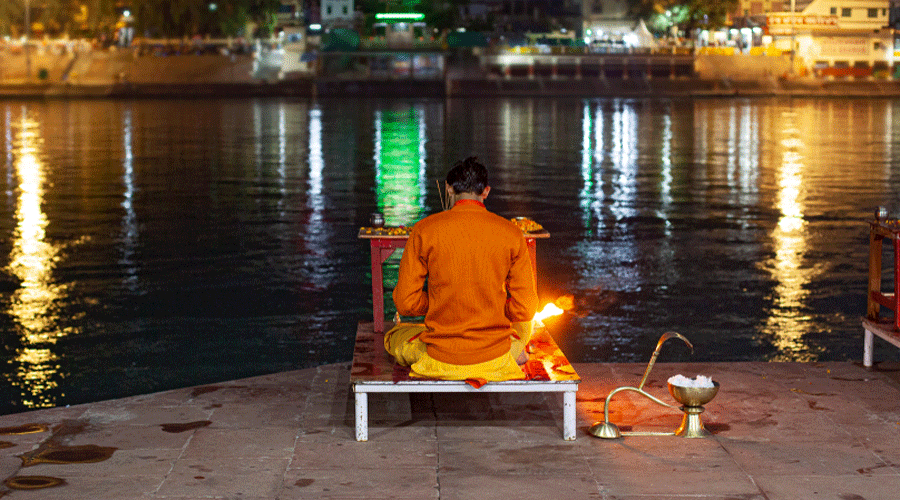Varanasi’s civic body has directed priests who conduct rituals for clients on the Ganga’s banks to pay a yearly registration fee of Rs 100 to reserve their wooden seats at the ghats.
Such a fee should not raise eyebrows in a secular country but squirming BJP leaders are unable to digest such a levy in Prime Minister Narendra Modi’s constituency.
Except for briefly during British rule, no government has down the centuries charged anyone for the myriad religious ceremonies — from prayers to death rituals — that the terraced banks witness round the year.
Veteran priest Kanhaiya Tripathi, secretary of the Akhil Bharatiya Tirth Purohit Mahasabha, described how Jawaharlal Nehru, the first Prime Minister the current Prime Minister loves to criticise, had saved Varanasi’s priests from having to pay a similar fee under British rule.
“An English magistrate had made the registration of the priests mandatory in Varanasi in 1928. Nehru pleaded the case in Allahabad High Court on behalf of the priests and won it,” he said.
The Varanasi Nagar Nigam has also imposed a Rs 4,000-a-day fee on cultural programmes on the ghats.
The ghats are a regular venue for street theatre performances, musical soirees or painting contests for children that so far charged the audiences nothing and had to pay nothing.
For “religious programmes”, the fee is Rs 500 per day (presumably to be paid by the priests’ clients) and for social work — the ghats often host food-for-poor programmes or NGO meetings — Rs 200 a day.
Those who regularly hold one event or the other on the banks, such as the Ganga Arti organisers, have the choice of paying a yearly fee of Rs 5,000.
“These are small amounts; the money will go into the maintenance of the ghats,” additional municipal commissioner Devi Dayal Verma said.
Vinay Rai, civic revenue officer, said the decision was taken on Wednesday and implemented “with immediate effect”. However, it was not announced through the media and few seemed to know about it on Thursday.
Even the ruling BJP councillors said they had only learnt about it through word of mouth and were not part of the decision, which appears to have been taken by bureaucrats.
The tax on priests and devotees sent the self-styled custodians of all things Hindu rushing to control the damage.
State religious affairs minister Neelkanth Tiwari said he was talking to civic officials. “Registration will not be mandatory for pandas and priests,” he said.
Narsingh Das, leader of the BJP councillors, said: “We came to know about it today (Thursday). The people are already struggling on so many fronts because of Covid-19 and the lockdown. We will oppose this.”
Sita Ram, a Congress councillor, criticised the fees imposed on “the poor pandas and priests”, social workers and “artistes who organise events and competitions here”.
“People come here from across the world for religious rituals. The government wants to make money at their cost. It’s anti-people and anti-religion,” he said.
Varanasi’s priests and pandas, however, are known to charge clients anything between Rs 50 and Rs 50,000 for the conduct of rituals.
Sita Ram said the Congress would not oppose two other decisions the civic body has taken: a Rs 500 fine on people using soap while bathing in the Ganga, and a Rs 2,100 fine on those throwing garbage into the river or on the banks.











